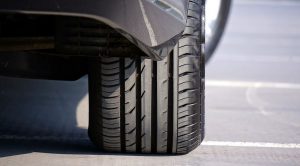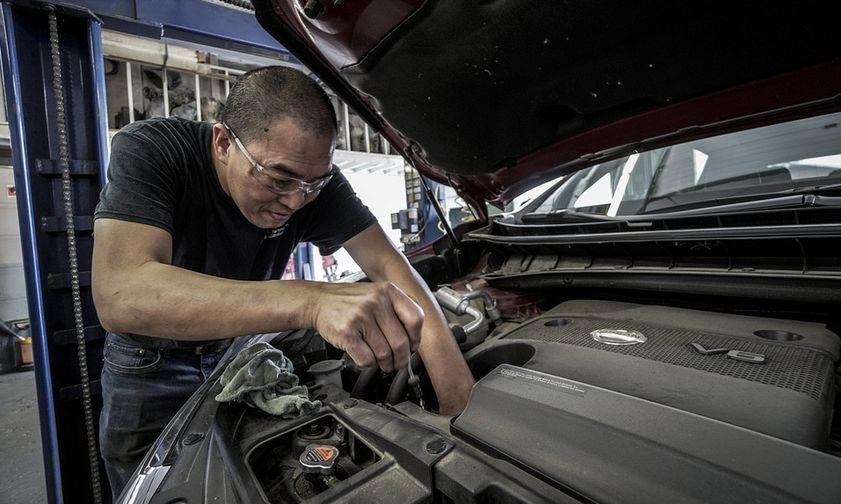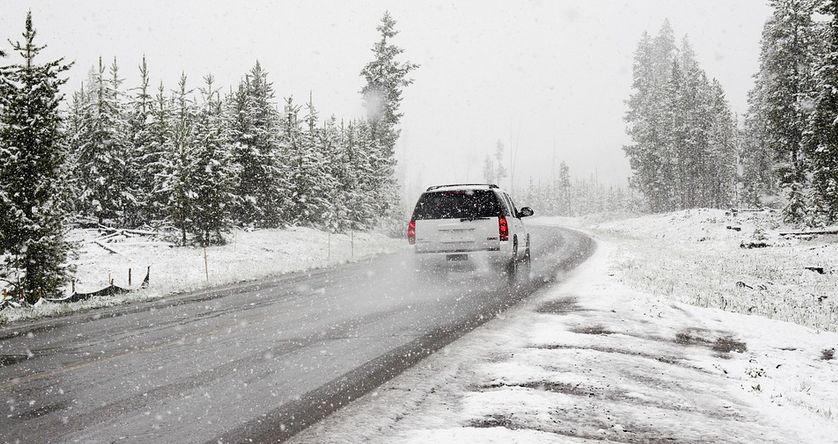Introduction
Every winter comes with blustery conditions, dipping temperatures, and freezing wind chills which could be dangerous for your car.
That is why we prepared this ULTIMAGE GUIDE to show you how to
prepare your car for winter and extreme weather conditions.
We will tell you exactly what to do with your car, in both scenarios, if you plan on driving it through the winter or if you plan on storing it somewhere.
6 steps to prepare your car for driving in winter conditions:
1. Start when temperatures start dropping and you start feeling a little bit of frost
2. Check your tire pressure
3. Test your battery
4. Check your windshield wiper fluid and oil
5. Add a coat of wax over your car
6. Inspect brake lights and headlights.
10 steps to properly store your car during winter (if not in use):
1. Clean your car
2. Check on the engine filter and oil
3. Disconnect your battery
4. Leave your manual transmission shift in gear
5. Do not engage the parking brake
6. Jack your car and place it on jack stands
7. Use lithium grease to coat your tires
8. Plug aluminum foil or steel wool into your tailpipe
9. Roll up all windows and properly close all the doors, hood, and trunk
10. Make sure your storage facility is moisture-free as much as possible.
Continue reading and we will explain all those steps in details.
When should I start preparing my car for Winter?
The best time to begin preparation for the coming winter is in the weeks before Thanksgiving. Once the temperatures start dropping, and you start getting a little bit of frost, then that is a good reminder to start.
Ways to Prepare Your Car for Winter and Extreme Weather Conditions
Whether your car is in the driveway or on the highway, extreme weather conditions can lead to trouble in different ways. Below are ways to ensure your car is ready to for the coming winter and provide a safe driving experience all through Extreme Weather Conditions.
Monitor Your Tire Pressure
 It is vital to check your tire pressure monthly, particularly in winter periods, since a tire’s pressure can significantly reduce as the air becomes colder. Having an under-inflated tire would lead to underperformance and this does not wear good for any user. The pressure in tires is calculated by Pounds Per Square Inch (PSI). If you are not sure about your tire PSI level and what it should be, you can ask from a certified repair shop. The appropriate inflation levels are usually found on the driver’s door jam.
It is vital to check your tire pressure monthly, particularly in winter periods, since a tire’s pressure can significantly reduce as the air becomes colder. Having an under-inflated tire would lead to underperformance and this does not wear good for any user. The pressure in tires is calculated by Pounds Per Square Inch (PSI). If you are not sure about your tire PSI level and what it should be, you can ask from a certified repair shop. The appropriate inflation levels are usually found on the driver’s door jam.
PRO TIP: There are certain tire styles that can better navigation through wintry weather. A decent rule of thumb is to, in any case, get an all-season tire with driving conditions specified to be less than 40 degrees Fahrenheit. Also, if you live in regions where temperatures may be much lower, it would be advisable to look into winter tires. These tires are made for superior traction and better handling in icy or snowy roads.
Test Your Battery
Most battery capacities decline significantly in cold conditions, so it is significant to have a battery expert check it out to guarantee it’s giving peak output. It also turns out to be even more vital to own a well-performing battery in winter and extreme weather conditions. The effect is harder on the battery cells and it limits their battery capacity. Parking your vehicle in a garage, away from the freezing cold, is another approach to protecting your battery.
PRO TIP: Owning jumper cables is also useful, not only for breaks down but also in a situation when you need to help others in need of a jumpstart.
Check/Change Windshield Wiper Fluid and Oil
 Your windshield wiper fluid and oil ought to be framed for winter. Wiper fluid containing more percentage of alcohol than water is not likely to freeze. Also, oil with lesser viscosity means less fluid in cold conditions. So, you may have to consider substituting it with oil having lower numbers. The wipers, like belts, are made from rubber and are susceptible to wear and tear, particularly when the windshield has ice on it. Investing a little more on wipers made precisely for winter conditions can ensure you have better visibility.
Your windshield wiper fluid and oil ought to be framed for winter. Wiper fluid containing more percentage of alcohol than water is not likely to freeze. Also, oil with lesser viscosity means less fluid in cold conditions. So, you may have to consider substituting it with oil having lower numbers. The wipers, like belts, are made from rubber and are susceptible to wear and tear, particularly when the windshield has ice on it. Investing a little more on wipers made precisely for winter conditions can ensure you have better visibility.
PRO TIP: Search for cracks in windshields and ensure wiper blades are functioning well. If you find cracks or chips, they are likely to get worse in winter and extreme weather conditions. It is recommended you have them checked by an expert to get the best possible solutions.
Also, ensure your defrosters are functioning properly, as they assist with sustaining visibility too.
Adding A Coat of Wax
Before winter starts, adding a fresh coat of wax can aid your car protection against further harm from salt and road dirt. While a key factor to combatting icy roads is the use of Road salt, they can also be a source for extensive damage in a car over time due to its corrosive nature. To reduce such occurrence, apply them to the lower parts of your car, including front grille, quarter panels, and behind the wheels. This move is necessary because ice, salt, and snow tend to accumulate more in these areas.
Inspect Brake Lights and Headlights
It is vital for your car to have fully functional brake lights and headlights especially when preparing or winter. Both lights are very helpful when it comes to your own visibility. So, if you notice any plastic light covers with haze on them or they appear discolored, you need to have them checked out. Such signs can provide a negative effect on their level of brightness.
PRO TIP: Plastic headlight lens repair kits can be obtained from several retailers if you elect not to use the service of an expert.
List of Items to Have in Your Car for Upcoming Winter and Extreme Weather Conditions
Having a spare tire in good condition is important if you also have the right tools to change when necessary. But they are also other important items to have in Your Car, especially for Upcoming Winter and Extreme Weather Conditions. Below are list for items needed to keep your car ready for winter and other emergency conditions.
- Battery powered radio and extra batteries
- First aid kit with pocket knife
- Flashlight, matches
- Emergency flares, fluorescent distress flag
- Extra blankets, hats, mittens, and socks
- Necessary medications Road salt and sand
- Shovel, windshield scraper, and small broom
- Tow chain, rope, and booster cables
- Water and snack food
How do you store a car for the winter (if no usage)?
 With temperature levels starting to drop, it is time to decide what you are going to do with your car. Several people would always elect to drive over the winter months; while others prefer storing their car during such periods. Well, if you elect to store your car during such periods, then it becomes important for you to prepare your Car for Winter Storage. Planning to store your car for the coming winter? Then this is a must read for you.
With temperature levels starting to drop, it is time to decide what you are going to do with your car. Several people would always elect to drive over the winter months; while others prefer storing their car during such periods. Well, if you elect to store your car during such periods, then it becomes important for you to prepare your Car for Winter Storage. Planning to store your car for the coming winter? Then this is a must read for you.
Cleaning
Getting your car clean now is better and becomes much easier than waiting for after winter season. A thorough car cleaning includes cleaning the exterior, interior, undercarriage, and under the hood. Removing all the dirt which your vehicle has accrued becomes much easier to remove now than waiting for them to settle in after several months.
The cleaning process should start from the interior, ensure to vacuum all dust while cleaning. After you are satisfied with your interior cleaning, you can proceed to other areas. Go over your car and ensure it is totally dry before proceeding to store. Any moisture left behind would corrode metal parts while in storage. Also, give your car the best wax job available.
PRO TIP: Ensure you carefully wash the undercarriage. Any dirt left would lead to corrosion or rust on the metal portions while in storage. Polish any chrome part to retain preservation over the winter period.
Car Preventative Maintenance
Giving your car Preventative maintenance will aid your car preparation for storage over winter.
Engine Fluid and Filter Change: The next step in preparing your vehicle for winter storage is changing the engine filter and oil. The oil change prior to storage would help lessen any moisture within the system. The following car fluids should be changed:
- Brake Fluid
- Clutch Fluid
- Coolant
- Engine Oil
- Washer Fluid
PRO TIP: It is recommended to use synthetic oil, as it boosts coating effects and does not collapse easily when compared to regular oil.
Disconnect Your Battery: Next step is disconnecting your battery. If you plan to store your car for long periods, it is recommended to remove your battery completely. Aging and low temperatures in winter can be a source of cracking in batteries, thus jeopardizing your engine bay to an acid spill.
PRO TIP: Using some type of battery maintainer/tender would extend your battery life when your car is stored. These devices are connected to the battery terminals in order to provide continuous and consistent charge to the battery.
Other preventative maintenance approach includes leaving your Manual transmission in gear, in order to eradicate any likelihood of shift rod corrosion. Also, irrespective of what happens, do not engage the parking brake!! If you leave the brake applied, the shoes are more likely to freeze with the drum, thus becoming difficult to disengage them. Protecting your tires comes with few options that include:
- Jacking your car and placing it on jack stands.
- Over-inflating your tires.
- Using lithium grease to coat your tires.
Your next worry should be eliminating possible entries for critters like mice. They are responsible for destroying a lot in cars. You can plug aluminum foil or steel wool into your tailpipe with for protection. Also, roll up all windows and properly close all the doors, hood, and trunk in your car to eliminate all hinge pressure and ultimately shut out critters.
PRO TIP: Silica can be placed in the interior of your car to retain free moisture.
Storage facility to Use
The best choice for storing your car is in a full climate-controlled building. Regrettably, this is not an option for most car owners. The other option for storing your car, which can be similarly effective, would be a facility without climate control, but proper precautions must be taken into action.
If your preferred storage area has only concrete floors, then place a carpet over the concrete. This process would prevent moisture from staying in the underside of your vehicle. Concrete floors are known to grasps plenty of moisture and the carpet will assist in keeping them away from your car’s underneath. It is also recommended to cover no less than the length of your vehicle (if you wish, you can cover the entire concrete floor). Another close possibility is the use of a plastic sheet or tarp for a similar purpose.
An outside carport can also pass as a storage facility, but ensure you have all sides protected from the wind. You can add additional car covers, but care must be taken in determining the outdoor condition the car is about to be subjected to.

The Top 20 Car Maintenance Question to Ask During Preparation for Winter
How to know if my tires good for the forthcoming winter?
Have an expert check out your car tires for both tire tread and air pressure.
What steps should be taken in storing my car during winter?
Proper cleaning, oil change the, inflated tires are needed. Kindly follow the detailed steps above, or contact a repair shop in your area for more recommendations.
Do I need to change my multi-weight oil?
Changing your car oil regularly is important. The use of quality multi-weight oil permits proper functioning even in winter.
Would my engine coolant work well in freezing conditions?
A good repair shop can check if your engine coolant will fare well. You can also get good recommendations as well.
My mechanic endorses an engine/injector/transmission cleaning. Is this needed?
Yes, especially if your vehicle spends more time idle. The outcome of such cleaning is always best for your car.
What should I do if my brakes grab/vibrate?
It implies something is wrong with the rotating component, and you need to have them checked out by a professional as soon as possible.
Do I need special wiper blades for winter?
Wiper blades are important in improving visibility, any worn wipers should be changed on time.
Do my wiper fluid need changing for upcoming winter?
Similar to wiper blades have an expert check to ensure they do not freeze during such periods.
Are my AC and heater functioning properly?
Both are a crucial part of your climate control system which keeps you warm. Have an expert check them out for you if you notice any change.
What items should I have within my trunk?
A winter survival kit would be perfect for the period of time. Additionally, you can look up the list above.
Is my battery properly charging?
Only a mechanic test can determine such. Ensure to have your battery checked before the start of this period.
How do I tell if my air filters are in good condition?
When you have a clogged filter, the engine works harder. If you notice any disparity, kindly visit a repair shop to have it checked out.
How is my car’s overall health?
Let the scan decide. It is important to have your car checked to complete for necessary maintenance before any bad weather. Safety is paramount.
Why do I need to change to winter tires?
All-season tires lose agility in the cold conditions, but winter tires are created to endure compliantly and retain grip in same conditions.
Should I use the service schedules recommended by my repair shop?
Yes, your repair shop only wants what is best for you and your car. Following such schedules would save you more in time.
I have no sign of leakage but my engine keeps consuming oil. What should I do?
Oil consumption follows a specified range. If you notice any irregularities, kindly contact an expert for further actions.
Why does my mileage drop so severely in winter?
Winter often increase fuel consumption by up to 25%. You can try Premium gas.
Is it essential to change my timing belt?
If it is stretched or bad, the results can be disastrous. Kindly replace them without any delay.
Can I change my headlights for brighter ones?
Yes, if the Bulbs meet the necessary standards that apply to aftermarket replacement bulbs.
Do you recommend buying aftermarket wheels?
Wheels designed to fit different vehicles and accurate placement is dependent on the studs. They are okay if hub-centric, i.e. the hole fits properly.
CONCLUSION
Whether you decide to follow these steps or not in preparing and your car for the winter and extreme weather conditions, it is significant to have an effective plan to tackle the biggest issues (light, moisture, vermin, temperature changes) your car may face in these conditions. If done properly, your car would appear even better, possibly like its first day, after this period. Also note that the information works contained here works best for short-term (i.e. several months), and not to be applied for long-term (i.e. several years).

